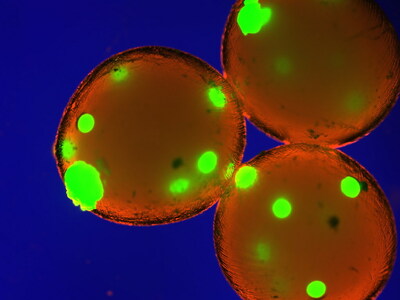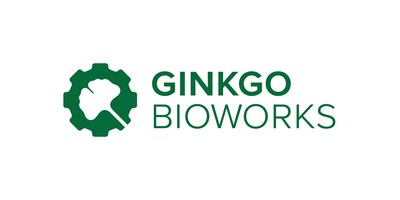FGen AG, a Ginkgo Bioworks Subsidiary, Awarded Funding Through European Innovation Council's Pathfinder Programme For Sustainable Milk Protein Production Project
- The EIC has tapped FGen and partners to work on developing a sustainable, alternative approach to milk production using only CO2 and electricity
- FGen will focus on ultra-high throughput screening of bacteria engineered to convert CO2 into a major whey protein
- Utilizing microbial systems — instead of livestock — to produce valuable food ingredients will be critical for sustainable bioproduction of foods, medicines, and chemicals
Converting CO2 directly into valuable proteins
The HYDROCOW team will work to genetically engineer hydrogen oxidizing bacteria (HOB) to convert carbon from CO2 gas and nitrogen from N2 into beta-lactoglobulin, a major whey protein found in cow's milk. Beta-lactoglobulin is used in food applications such as infant formula, protein supplements, and baked goods. Microbial systems that can produce valuable food ingredients and other products directly from CO2 will be critical for sustainable bioproduction of foods, medicines, and chemicals.
Leveraging FGen's powerful screening technology
Engineered microbes capable of producing beta-lactoglobulin will undergo ultra-high throughput testing at FGen, leveraging its cutting-edge platform that makes it possible to rapidly search through up to 1 million HOB variants in a single run. The highest performing HOB strains identified by FGen will then be validated by Solar Foods under autotrophic growth conditions in an industrially-relevant bioproduction environment.
"We built our platform to help innovative companies like Solar Foods enable sustainable nutrition solutions, including alternative dairy. We're excited to leverage our powerful screening technology through FGen, and to play a critical role in this space for our commercial and government partners around the world," says Dr. Andreas Meyer, Senior Foundry Lead at Ginkgo Bioworks and co-founder of FGen. "This project is built around a world-class team of research and development partners, and we're proud to do our part to bring this promising technology forward."
"The EIC supports the HYDROCOW project in its pursuit to develop sustainable bioproduction methods directly from CO2 and nitrogen compounds," said EIC Project Officer Olivier Dahon. "EIC is supporting scientific innovation through our portfolio approach for funding research projects under the Pathfinder Challenge: 'Carbon Dioxide and Nitrogen Management and Valorisation.' Bringing precision fermentation for sustainable food ingredients from the lab to the market is considered critical for the achievement of the EU Green Deal. Success in this area can provide the technological basis to contribute to a sustainable development of our society," said EIC Program Manager Francesco Matteucci.
If successful, the HYDROCOW project will enable novel nutrition-focused bioproduction methods that are not reliant on photosynthesis and conventional agriculture, instead converting atmospheric carbon directly into whey proteins, while saving time, energy, and land associated with current practices in the process.
About Ginkgo Bioworks
Ginkgo Bioworks is the leading horizontal platform for cell programming, providing flexible, end-to-end services that solve challenges for organizations across diverse markets, from food and agriculture to pharmaceuticals to industrial and specialty chemicals. Ginkgo's biosecurity and public health unit, Concentric by Ginkgo, is building global infrastructure for biosecurity to empower governments, communities, and public health leaders to prevent, detect and respond to a wide variety of biological threats. For more information, visit ginkgobioworks.com and concentricbyginkgo.com, read our blog, or follow us on social media channels such as X (formerly known as Twitter) (@Ginkgo and @ConcentricByGBW), Instagram (@GinkgoBioworks and @ConcentricByGinkgo), Threads (@GinkgoBioworks) or LinkedIn.
Funding for FGen AG is provided by the Swiss State Secretariat for Education, Research and Innovation (SBFI Nr. 23.00349).
Forward-Looking Statements of Ginkgo Bioworks
This press release contains certain forward-looking statements within the meaning of the federal securities laws, including statements regarding the capabilities and potential success of the partnership and Ginkgo's cell programming platform. These forward-looking statements generally are identified by the words "believe," "can," "project," "potential," "expect," "anticipate," "estimate," "intend," "strategy," "future," "opportunity," "plan," "may," "should," "will," "would," "will be," "will continue," "will likely result," and similar expressions. Forward-looking statements are predictions, projections and other statements about future events that are based on current expectations and assumptions and, as a result, are subject to risks and uncertainties. Many factors could cause actual future events to differ materially from the forward-looking statements in this press release, including but not limited to: (i) volatility in the price of Ginkgo's securities due to a variety of factors, including changes in the competitive and highly regulated industries in which Ginkgo operates and plans to operate, variations in performance across competitors, and changes in laws and regulations affecting Ginkgo's business, (ii) the ability to implement business plans, forecasts, and other expectations, and to identify and realize additional business opportunities, (iii) the risk of downturns in demand for products using synthetic biology, (iv) the uncertainty regarding the demand for passive monitoring programs and biosecurity services, (v) changes to the biosecurity industry, including due to advancements in technology, emerging competition and evolution in industry demands, standards and regulations, (vi) our ability to realize the expected benefits of merger and acquisition transactions, (vii) the outcome of any legal proceedings against Ginkgo, including as a result of recent acquisitions, (viii) our ability to realize the expected benefits from and the success of our Foundry platform programs, (ix) our ability to successfully develop engineered cells, bioprocesses, data packages or other deliverables, and (x) the product development or commercialization success of our customers. The foregoing list of factors is not exhaustive. You should carefully consider the foregoing factors and the other risks and uncertainties described in the "Risk Factors" section of Ginkgo's quarterly report on Form 10-Q filed with the
GINKGO BIOWORKS INVESTOR CONTACT:
investors@ginkgobioworks.com
GINKGO BIOWORKS MEDIA CONTACT:
press@ginkgobioworks.com
![]() View original content to download multimedia:https://www.prnewswire.com/news-releases/fgen-ag-a-ginkgo-bioworks-subsidiary-awarded-funding-through-european-innovation-councils-pathfinder-programme-for-sustainable-milk-protein-production-project-302018118.html
View original content to download multimedia:https://www.prnewswire.com/news-releases/fgen-ag-a-ginkgo-bioworks-subsidiary-awarded-funding-through-european-innovation-councils-pathfinder-programme-for-sustainable-milk-protein-production-project-302018118.html
SOURCE Ginkgo Bioworks








